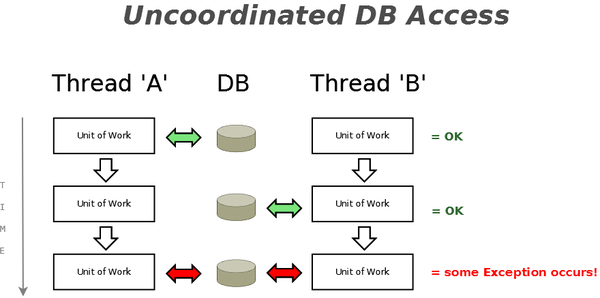Co-ordinated DB Access (Thread-safe DB Access): Difference between revisions
(Created page with "= THIS PAGE IS WORK IN PROGRESS = '''This page is currently being worked on. Please come back later to this page when you have been notified that it is finished!''' ==Co-ordi...") |
|||
| Line 6: | Line 6: | ||
===The Problem it Solves=== | ===The Problem it Solves=== | ||
Before we had ''Co-ordinated DB Access'' in place, users ran into various Exceptions when multi-threaded DB access occurred - no matter whether that multi-threaded DB access was done intentionally/deliberately by the programmer, or whether it happened as something that resulted 'accidentally' because of an action the user took (and which we didn't prevent from happening). Co-ordinated DB Access not only prevents that from happening, but also provides new options to safely run program code that access the DB 'in parallel'. | Before we had ''Co-ordinated DB Access'' in place, users ran into various Exceptions when multi-threaded DB access occurred - no matter whether that multi-threaded DB access was done intentionally/deliberately by the programmer, or whether it happened as something that resulted 'accidentally' because of an action the user took (and which we didn't prevent from happening). Co-ordinated DB Access not only prevents that from happening, but also provides new options to safely run program code that access the DB 'in parallel'. | ||
[[File:Uncoordinated DB Access.png|600px|center|''Schematic diagram showing uncoordinated DB access'']] | |||
===The Solution=== | ===The Solution=== | ||
Revision as of 08:50, 17 March 2015
THIS PAGE IS WORK IN PROGRESS
This page is currently being worked on. Please come back later to this page when you have been notified that it is finished!
Co-ordinated DB Access: Overview
The Problem it Solves
Before we had Co-ordinated DB Access in place, users ran into various Exceptions when multi-threaded DB access occurred - no matter whether that multi-threaded DB access was done intentionally/deliberately by the programmer, or whether it happened as something that resulted 'accidentally' because of an action the user took (and which we didn't prevent from happening). Co-ordinated DB Access not only prevents that from happening, but also provides new options to safely run program code that access the DB 'in parallel'.
The Solution
The primary solution was to make the TDataBase Class (OpenPetra's Database Access and Abstraction Layer) thread-safe (this got addressed by solving Bug #3852). That in itself prevented the mentioned Exceptions from happening.
Building on that, ...
- provisions have been put in place to allow the OpenPetra software engineers to react programmatically to various new situations where the now co-ordinated DB Access can raise specific Typed Exceptions in case the desired 'parallel-ity' cannot be achieved automatically in a given situation;
- provisions have been made in the client-side 'Unhandled Exception Handler' to automatically show 'friendly and helpful' messages to the user when the software engineers didn't react programmatically to various new situations (yet).
It is expected that the automatic 'friendly and helpful' messages may well be enough for many situations - the ability to react programmatically to various new situations is merely there to allow for 'better' provisions for the user, e.g. to give Retry/Cancel options, or to prevent the user from taking certain actions in the first place that could (later) lead to the inability to take certain actions (e.g. disallowing the opening of a screen under certain circumstances because the circumstances would mean that any entered data could not be saved by the user later on).
Pseudo-parallel Execution
TODO
Details of the Implementation
What is Done Automatically And What Needs to be Handled Manually
Automatic (and Fully Transparent): Thread-safe DB Access through the TDataBase Class
Automatic Thread-Safety
The thread-safety is fully transparent to the Software Engineer, that is, the software engineer doesn't need to do anything to make sure it works, and doesn't even know how it works.
(For the curious: Thread-safety is achieved by using a SempaphoreSlim Object (FCoordinatedDBAccess), two Methods that 'flip' the switch between protection/non-protection (WaitForCoordinatedDBAccess and ReleaseCoordinatedDBAccess) and by calling those two Methods appropriately in all places where it is required to achieve thread-safety across everything the TDataBase Class can do.)
Automatic Timeout (Stalling/Deadlock Protection)
TODO
Configuration (Optional): Timeout
TODO
Semi-Automatic: (DB-)Call Retries
TODO
Configuration (Optional): Number of Retries
TODO
Automatic: Exception Handling in Case of Timeout
TODO
Examples
TODO
Manual: Exception Handling in Case of Timeout
TODO
Examples / Implementations
TODO
Challenges
TODO
The Future: A Safe-to-use, Multi-threading Enabled OpenPetra
TODO
